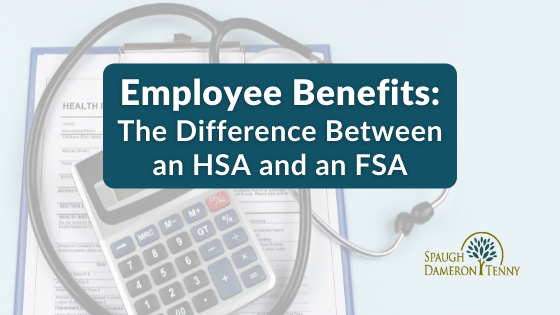A common question we receive during this time of year has to do with employee benefits. Most employers are hosting open enrollment to sign up for health insurance and other benefits programs. Many people are unclear about what a Health Savings Account (HSA) and a Flex Spending Account (FSA) are and which option will best meet their needs.

It is helpful to start by reviewing what an HSA and an FSA account are and then go into what each has in common and what is contrasting.
This type of savings account lets you set aside money pre-tax to pay for qualified medical expenses. HSAs can be used to save money for medical expenses. In order to qualify for an HSA, you must be enrolled in a high-deductible health insurance plan (HDHP) as defined by the government.
This account is an employer-sponsored healthcare benefit that allows employees to set aside a certain amount of money, which is pre-determined by the government, to help cover the cost of eligible medical expenses. It is similar to a savings account but is used for qualified health-related costs. FSAs work on a yearly plan basis and are funded through regular payroll deductions on a pre-tax basis.
As mentioned before, account holders generally have a debit card that you use at the provider or store when you purchase eligible items. There is a penalty if you use the debit card on non-eligible items. However, with an HSA, any balance that accrues and exists after age 65 can be used on anything without penalty. Now, this does not mean it is not a health-related account. It is still designed to be used for healthcare expenses. So, if you use it for healthcare expenses or even qualifying insurance premiums, it is tax-free and penalty-free. But after age 65, you can use it on non-health-related expenses penalty-free. Then, you will just be subject to taxation on the withdrawal.
So, that is something that many folks anticipate and plan for as they start thinking more assertively about retirement.
In general, the answer is no because both accounts cover the same types of expenses. The IRS doesn’t want you deferring into both an FSA and an HSA to cover the same costs with pre-tax, tax-free money. The exception to the rule is that some employers will offer a limited use Flex Spending Account. So, if the FSA has limited use, it will only cover dental and vision expenses as qualifying expenses. In that case, your HSA can cover health, dental, and vision, and your FSA can only cover dental and vision. If that is the setup with your employer, then yes, you can have both an FSA and an HSA.
We know that benefits elections are not a one-size-fits-all recommendation. Your financial planner can help answer questions and talk to you through your unique financial situation to determine which benefits elections are best suited for you and your family. Please connect with your SDT financial planner if you have questions regarding your options.
If you have additional questions, you can read through IRS Publication 969, which has all the details on both plans and a couple of other options that generally are not as prevalent.
IRS Publication 969, Health Savings Accounts and Other Tax-Favored Health Plans
CRN202410-1133449

Shane Tenny, CFP®, is the Managing Partner of Spaugh Dameron Tenny and a nationally recognized financial advisor. Since 2000, he has combined extensive financial knowledge with a passion for behavioral finance—helping clients make informed decisions based on both data and mindset. Shane often contributes to industry publications, appears as a guest on podcasts, and has been a leader in the financial planning field for years. He is known for making complex topics clear and practical for busy, high-income professionals seeking personalized advice they can trust.
Finance has a reputation for being complicated, and not without reason. Like many specialized fields, it comes with its own language, acronyms, and ...
Read More →If I had a dollar for every time a new client made one of the comments below, I’d have … well, a lot more dollars.
Read More →At Spaugh Dameron Tenny, part of our role is helping clients start each year grounded in facts, not headlines, assumptions, or half-answers. When ...
Read More →